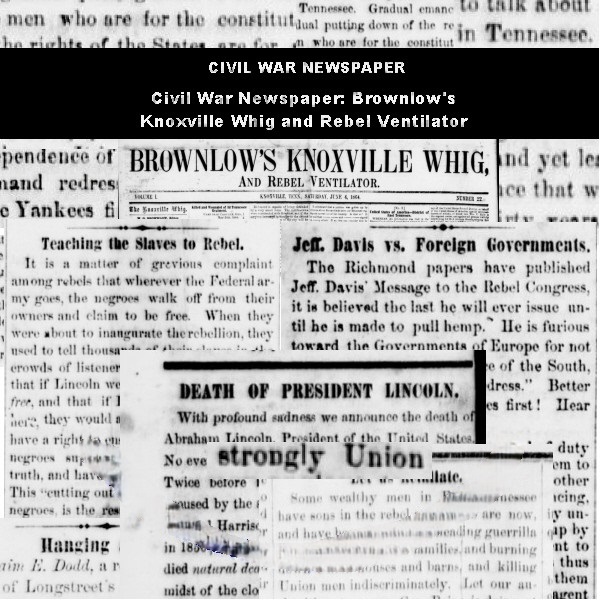
Civil War Newspaper: Brownlow’s Knoxville Whig and Rebel Ventilator
$19.50
Description
William Gannaway Brownlow: Tennessee Politics and the *Whig*
Timeline of Main Events
- 1830s: William Gannaway Brownlow was sued for libel and shot in a religious dispute. He also experienced other violent encounters, including being shot at, shot in the leg, beaten, and severely injured in club attacks.
- 1839: William Gannaway Brownlow first published the Tennessee Whig in Elizabethton, Tennessee.
- 1840: Brownlow moved his publishing operation to Jonesborough, Tennessee.
- 1840 – 1849: Brownlow’s newspaper was published under various titles, including the Whig, the Jonesborough Whig, and the Jonesborough Whig, and Independent Journal.
- May 1849: Brownlow moved his newspaper to Knoxville, Tennessee, where it became the Knoxville Whig and Independent Journal.
- 1855: Brownlow’s Knoxville Whig was founded, expressing his strong views against secession and the inferiority of Black people.
- 1861: Brownlow’s criticism of the Confederacy led the Confederate government to shut down the Brownlow’s Weekly Whig for two years.
- December 6, 1861: Brownlow was arrested on a charge of high treason against the Confederacy.
- 1862: Brownlow spent much of the year touring the North, delivering pro-Union lectures.
- Fall 1863: Brownlow returned to Knoxville. The federal government provided him with a press, type, $1,500, and a government printing contract.
- November 11, 1863: The first issue of the weekly Brownlow’s Knoxville Whig, and Rebel Ventilator was published.
- 1864: Brownlow was influential in the convention that abolished slavery in Tennessee and led to the creation of a new state government. Unionists gained control of the Tennessee legislature.
- April 1865: William Gannaway Brownlow was elected Governor of Tennessee.
- April 5, 1865: Brownlow officially began his term as the 17th Governor of Tennessee.
- Post-April 1865: Under Brownlow’s governorship, laws were passed to disenfranchise Confederate supporters and enfranchise Black men, intensifying hatred towards Brownlow and the Unionists.
- When Brownlow became Governor: He turned over the editorship of the Whig to his son, John Bell Brownlow.
- February 1866: The title of the newspaper reverted to Brownlow’s Knoxville Whig.
- February 25, 1869: William Gannaway Brownlow’s term as Governor of Tennessee ended.
- 1869: The Brownlow’s Knoxville Whig was sold, and Thomas H. Pearne became the editor. It was briefly renamed the Weekly Knoxville Whig and then quickly changed to the Knoxville Weekly Whig.
- 1869 – 1875: Despite fragile health after resigning as governor, Brownlow served a six-year term in the United States Senate.
- 1875: Brownlow returned to Knoxville and became editor-in-chief of William Rule’s weekly Knoxville Whig and Chronicle.
- April 29, 1877: William Gannaway Brownlow died.
Cast of Characters
- William Gannaway Brownlow: A Methodist parson known as “The Fighting Parson.” He was a highly controversial figure in Tennessee politics, known for his uncompromising and radical viewpoints, pugnacious editorial stances, and willingness to meet violence with violence. He published several newspapers, including the Tennessee Whig, Knoxville Whig and Independent Journal, and Brownlow’s Knoxville Whig and Rebel Ventilator. He was a staunch Unionist during the Civil War, a critic of the Confederacy, and later a radical Republican governor of Tennessee (1865-1869) who implemented policies disenfranchising Confederates and enfranchising Black men. He also served as a U.S. Senator.
- John Bell Brownlow: Son of William Gannaway Brownlow. He took over the editorship of the Whig when his father became Governor of Tennessee.
- Thomas H. Pearne: Became the editor of Brownlow’s Knoxville Whig after it was sold in 1869. He briefly renamed it the Weekly Knoxville Whig, which was quickly changed to the Knoxville Weekly Whig.
- William Rule: Publisher of the weekly Knoxville Whig and Chronicle. William Gannaway Brownlow joined his paper as editor-in-chief after returning to Knoxville in 1875.
- Abraham Lincoln: President of the United States during the Civil War. Brownlow supported his emancipation proclamation.
Civil War Newspaper: Brownlow’s Knoxville Whig and Rebel Ventilator
414 pages, 175 issues of the Civil War newspaper Brownlow’s Knoxville Whig and Rebel Ventilator dating from November 11, 1863 to February 21, 1866.
Published by William Gannaway Brownlow, the 17th governor of Tennessee (April 5, 1865 – February 25, 1869), a Methodist parson known as the “The Fighting Parson.” Brownlow’s uncompromising and radical viewpoints made him one of the most divisive figures in Tennessee political history and one of the most controversial politicians of the Reconstruction-era south.
Brownlow’s pugnacious editorial stances and willingness to meet violence with violence made him famous and earned him the nickname, “The Fighting Parson.” In the 1830s, before he published his first newspaper, he was sued for libel and was shot in a religious dispute. In the years that followed, Brownlow was shot at through a window in his home, shot in the leg during a fistfight, beaten at a camp meeting after his derringer misfired, and was severely injured by two attacks with clubs. One of his newspaper’s slogans sums up his journalism and his life, “Independent in all things—Neutral in nothing.”
Parson William Gannaway Brownlow first published the Tennessee Whig
in Elizabethton, Tennessee, in 1839. Brownlow soon moved his publishing operation to Jonesborough, TN in 1840. Brownlow changed the name of the newspaper several times. Between 1840 and 1849 it was published under the titles: the Whig, the Jonesborough Whig, the Jonesborough Whig, and Independent Journal.Brownlow moved his newspaper to Knoxville in May 1849, where it became the Knoxville Whig and Independent Journal. Seemingly never in doubt about his own rectitude, Brownlow regarded anyone who disagreed with him about religion or politics as an enemy. The circuit-riding Methodist parson turned to the press to spread his harsh anti-Presbyterian, anti-Calvinist, anti-Baptist rhetoric, and to branch out into politics. Brownlow’s speeches and publications drew both attention and anger.
Founded in 1855, Brownlow’s Knoxville Whig expressed Brownlow’s fervently held views on the inferiority of blacks and unalterable opposition to secession. In 1861, Brownlow’s criticism of the Confederacy led the Confederate government to shut down the Brownlow’s Weekly Whig for two years. On December 6 of that year, Brownlow was arrested on a charge of high treason against the Confederacy. Brownlow spent much of 1862 touring the North, giving pro-Union, invective-spiced lectures. When he returned to Knoxville in the fall of 1863, the federal government provided him with a press, some type, $1,500, and a government printing contract. On November 11, 1863, the first issue of the weekly Brownlow’s Knoxville Whig, and Rebel Ventilator rolled off the press.
Brownlow used the paper to attack the secessionists as “the negroworshipping aristocracy [and] the cotton and tobacco-planting lords.” He declared that the “halter” (noose) should be used against the rebellion’s leaders, and he backed Lincoln’s emancipation proclamation. Thus, the political trajectory of Brownlow’s editorials had changed from southern Whig in the 1840s to radical Republican by the mid-1860s. In 1864, Brownlow was a force in the convention that abolished slavery in Tennessee and that led to the creation of a new state government. The Unionists won control of the Tennessee legislature, and Brownlow was elected governor in April 1865. Hatred of Brownlow and the Unionists became more intense as laws were passed to disenfranchise those who supported the Confederacy and to give blacks the vote.
When Brownlow became governor, he turned over the editorship of the
Whig to his son, John Bell Brownlow. In February 1866, the title reverted to Brownlow’s Knoxville Whig. In 1869, the paper was sold, and Thomas H. Pearne became editor. It was renamed the Weekly Knoxville Whig, but after only one edition the owners changed the name again to the Knoxville Weekly Whig. After resigning as governor in 1869 and despite his fragile health, Brownlow served a six-year term in the United States Senate. He returned to Knoxville in 1875 and joined William Rule’s weekly Knoxville Whig and Chronicle as editor-in-chief. William Gannaway Brownlow died on April 29, 1877.
Sources: Library of Congress, Public Library of Knoxville and Knox County, and the University of Tennessee Library
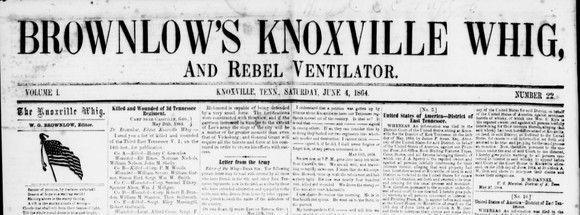
Related products
-
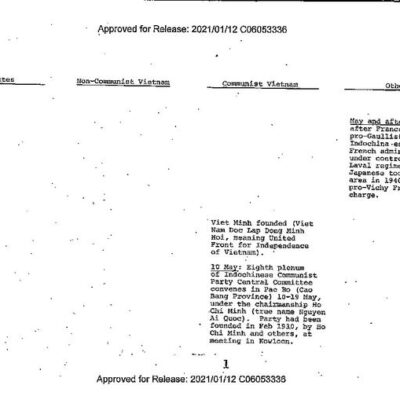

Vietnam War: CIA Chronology of the Conflict, 1940-1973 (1974)
$1.99 Add to Cart -
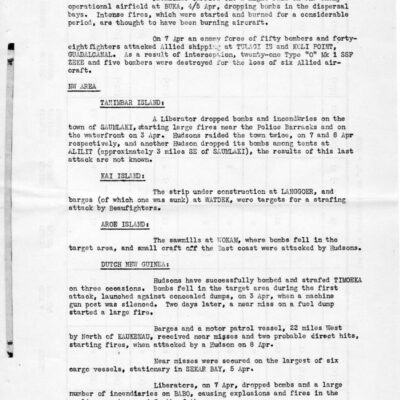
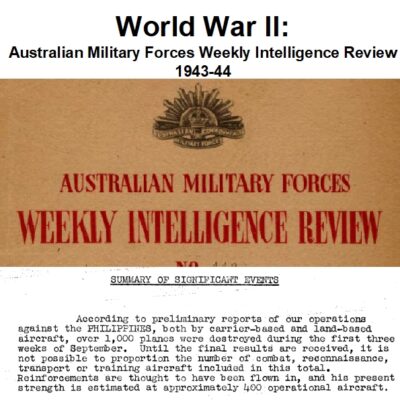
World War II: Australian Military Weekly Intelligence Reports 1943-44
$3.94 Add to Cart -
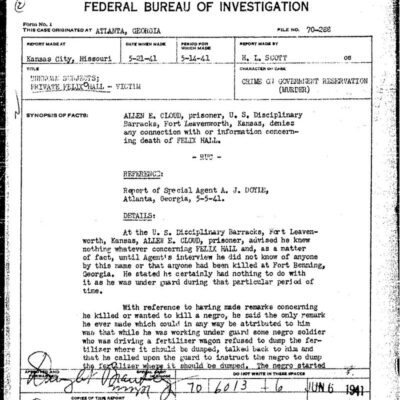
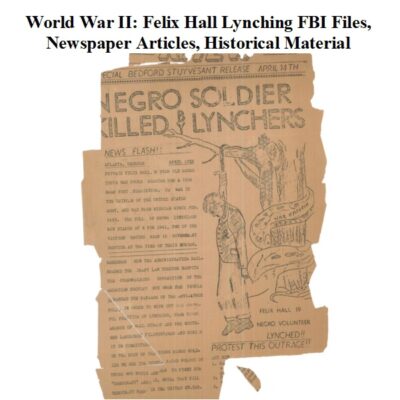
World War II: Felix Hall Lynching – FBI Files, Articles, Historical Records
$9.99 Add to Cart -
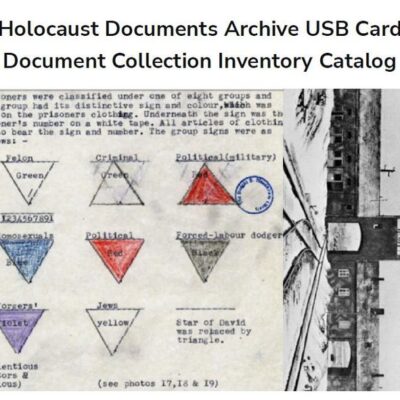
Holocaust Document Archive PDF file – Inventory Catalog of Document Collection
$3.94 Add to Cart